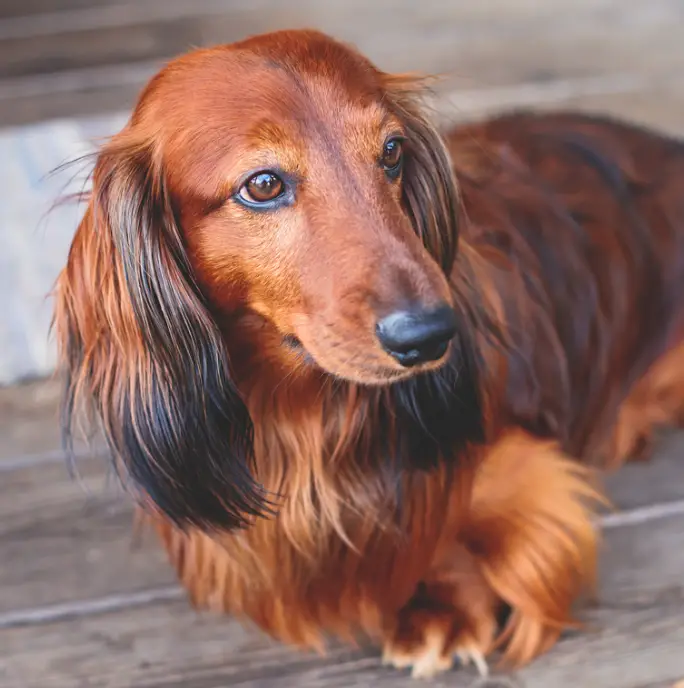It’s crucial, in my opinion, to start by emphasizing how uncommon it is for a dog to be a “bad” dog. You are setting yourself up for failure if you genuinely believe that the reason your dog—or any dog—is acting violently is because it’s a nasty dog. It can be challenging to accept, particularly when the hostility seems out of control. However, you will be much better prepared to handle the issue if you approach the whole event with an open mind to knowing a little bit more about why dogs act aggressively. As long as you have the tenacity to consider all of your options, there is always hope.
Why Is My Dachshund So Aggressive?
If you’ve ever owned a Dachshund, you are aware of how devoted and fun-loving they are in general. However, even the most well-mannered Dachshunds can exhibit unexpected aggression for no apparent cause. Although dealing with this behavior might be perplexing and unpleasant, there are typically a few underlying factors.
- Fear
If your Dachshund feels threatened by someone or something, it may act violently. This may be anything from a new resident moving into a noisy neighborhood. Helping your Dachshund feel more secure and safe is crucial if they are acting violently out of fear. You can accomplish this by giving them a safe place to go, like their bed or crate, and exposing them to the things that make them anxious gradually.
- Pain
Pain is another frequent factor in violent conduct. Your Dachshund may behave violently to defend themselves from further harm if they are in pain. It’s crucial to take your Dachshund to the doctor for an examination if you suspect that their hostility may be caused by pain. Your dog may be acting violently to defend itself because it is ill or injured.
- Mommy instincts
Your female Dachshund may be acting violently to defend her babies if she has recently given birth. There is no need to be concerned because this is a normal maternal instinct. However, it’s always advisable to speak with your veterinarian if you have any worries.
- Anxiety
Another explanation is that they are experiencing fear or anxiety as a result of a change in their environment, such as relocating to a new house or adopting a new pet.
If your Dachshund is acting aggressively because of anxiety, there are several things you can do to reduce their tension, like giving them a secure place to go when they feel overwhelmed and maintaining a regular schedule.
- Poor Socialization
One of the most frequent reasons of aggression in dogs is poor socialization. Your Dachshund may be scared or anxious around unfamiliar people and settings if they have not had the correct socialization, which can result in aggressive behavior.
The easiest way to stop this is to start socializing your Dachshund early on. This entails giving kids pleasant exposure to novel people, places, and experiences. For instance, you may accompany them to obedience training sessions, walks through unfamiliar neighborhoods, or the dog park.
Aggressive behavior in Dachshunds is frequently brought on by fear or anxiety. It’s crucial to look for the root of your dog’s aggression so you can make them feel safer and more at ease.
Whatever the cause of your Dachshund aggression, you should get professional advice from a licensed dog behaviorist to prevent the issue from getting worse.
What Are Signs Of Aggression In Dachshunds?
Most people can recognize certain very obvious symptoms of hostility that dogs may express to us. Barking is the most basic. It’s crucial to tell the difference between a dog barking to alert you or when they’re excited and a dog acting aggressively.
The more violent a bark is, the deeper it usually is. Generally speaking, but not usually, squeaky yapping is more fun. It’s crucial to trust your instincts and consider the situation in which the barking occurred. A dog lowering itself gives itself the spring and force needed to move fast, which is another obvious symptom, along with snarling and growling.
Similar to the way a cat pounces. Again, context is key when it comes to snarling. The following are a few less well-known indications of aggression:
- Standing dead still.
- Charging.
- Muzzle punching (head butting almost).
- Baring teeth
How To Train An Aggressive Dachshund
Maybe you already have a Dachshund, and lately, it has been acting aggressively, leaving you worried and perplexed about what might have caused it. When this occurs, try not to get depressed. Instead, attempt methods that might be able to tame your dog to help them stop the behavior.
The following advice can help you prevent Dachshund aggression.
- Use Positive Reinforcement
A straightforward technique called positive reinforcement involves rewarding your dog once it complies with your request. If your dog starts to growl or bark at people or other animals it sees, try to move it slowly away from them. Once it stops growling or barking, reward it with treats. You can start by carrying some of your dog’s favorite treats while you walk it outside your house.
Do this repeatedly until your dog gradually loses his aggressive behavior toward strangers. This will not only assist you in resolving your dog’s behavioral issue, but it will also strengthen your relationship.
- Ask For Professional Help
It can be difficult at times to train your dog to stop being aggressive on its own, so getting professional assistance is probably the most effective way to solve the issue. You can consider taking your Dachshund to a puppy class or personally hire a dog whisperer or animal behaviorist to make the job done for you.
- Never Punish Your Dog
It is absolutely wrong to discipline your dog for acting aggressively, whether physically or verbally. Positive training techniques are said to lessen or gradually end a Dachshund’s aggression, whereas coercion would only have the opposite effect. Keep in mind that your dog’s experiences have a bigger impact on its behavior than its ancestry, so don’t blame it on that!
- Don’t Play Rough Games With Your Dog
Playtime is a fantastic way to keep your dog busy, but know when to stop. Playing rough with your Dachshund while it’s still a puppy may be entertaining, but once it starts to exhibit aggressive behavior as a result, it can become a serious issue.
It’s critical to keep in mind that Dackels were originally bred for hunting, not as cuddly, naturally peaceful lap dogs. In order to avoid getting hurt, put your dog on timeout if the playing becomes too intense and learn how to calm it down. However, you should never start physical altercations with your dog as this could teach it that attacking you is okay.
- Check to see if your dog requires medication.
Your dog may be experiencing internal problems that you need to address as soon as you can if there is no obvious cause for its behavior. Your dog may be exhibiting aggression because it is likely going through anxiety, trauma, fear, or physical pain that you are unaware of.
- Be Clear About the Needs You Think Your Dog Has.
If you have owned a Dachshund for any length of time, you should be honest with yourself about your ability to care for its needs. Given that your lifestyle has a significant impact on your dog, consider whether your actions or the environment you have created may be to blame for its aggressive behavior.
Conclusion
Dachshunds are known for being among the most aggressive dogs a person can own, but not all of them exhibit aggression, and for some dogs, it’s never really too late to train them to behave differently. Dachshunds can be loving, devoted pets that are ideal for any family that welcomes dogs with the right upbringing and training!
Additionally, the aggressiveness of your Dachshund might be a complicated problem that needs your attention and effort to fix. Recognize that you cannot stop your dog’s aggression if you are unaware of its source(s). Similar to how neglecting to properly care for a Dachshund would only make its behavior worse,
Last but not least, if your dog’s behavior has completely escalated, seeking professional assistance is one of the best decisions you can make. However, if you’d prefer not to, the simplest efforts of a regular owner may be sufficient for a Dachshund to avoid or draw back from being aggressive. In fact, it all comes down to being socially active consistently, forming strong bonds with others, and treating them with respect.






